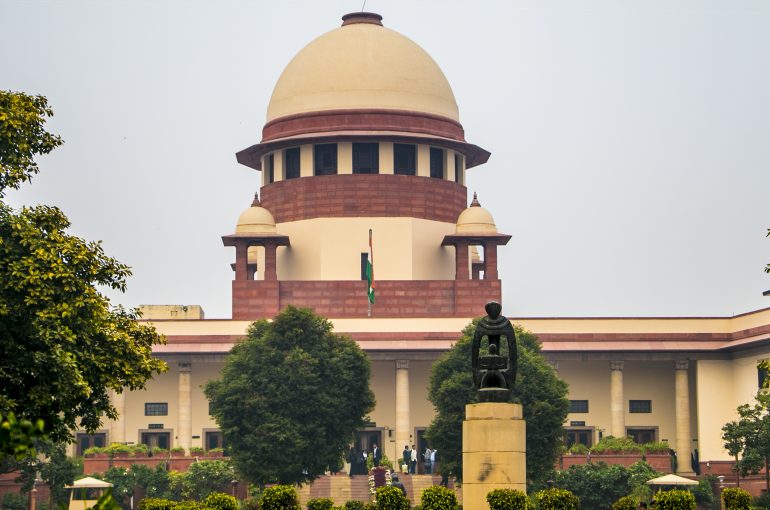SUPREME COURT REINFORCES ARBITRATION AUTONOMY: NO ROLE FOR NON-SIGNATORIES, NO JUDICIAL INTERVENTION POST APPOINTMENT

On August 13, 2025, the Supreme Court of India delivered an important Judgment in Kamal Gupta & Anr. v. M/s L.R. Builders Pvt. Ltd. & Anr. (SLP (Civil) Nos. 4775-4779/2025), addressing two fundamental questions in arbitration law. The Bench comprising Justices Chandurkar and Narasimha, unanimously ruled against non-signatory participation in arbitration proceedings and prohibited judicial intervention after arbitrator appointment, significantly strengthening arbitration’s core principles of consent, confidentiality, and autonomy.
Background of the Case
The dispute arose from a family settlement between Pawan Gupta and Kamal Gupta, formalized through a Memorandum of Understanding/Family Settlement Deed dated 09.07.2019. Crucially, Rahul Gupta, Kamal Gupta’s son, was not a signatory to this agreement. When arbitration proceedings commenced under Section 11(6) of the Arbitration and Conciliation Act, 1996, Rahul Gupta filed intervention applications seeking to participate despite his non-signatory status.
On 22.03.2024, the Court appointed a sole arbitrator and dismissed Rahul Gupta’s intervention applications, clearly stating that non-signatories’ presence was unnecessary for dispute adjudication. However, Rahul Gupta subsequently filed fresh applications in the disposed proceedings, seeking permission to remain present during arbitration and access to all proceedings. The lower court erroneously permitted this participation, prompting the present appeals.
Legal Questions Addressed
The Supreme Court framed two critical questions:
- Whether non-signatories can remain present in arbitration proceedings
- Whether courts can issue directions after arbitrator appointment under Section 11(6)
Key Legal Principles Established
Non-Signatory Participation Prohibited
The Court’s analysis centered on Section 35 of the Arbitration Act, which limits award’s binding effect to parties and persons claiming under them. Since arbitral awards cannot bind non-signatories, the Court found no legal basis for their participation.
Confidentiality Mandate Under Section 42A
A pivotal aspect of the Judgment involved Section 42A, which mandates strict confidentiality in arbitral proceedings. The Court ruled that allowing non-signatories to observe proceedings would directly breach this statutory confidentiality requirement. This protection serves multiple purposes: safeguarding trade secrets, preserving business relationships, and maintaining arbitration’s private character as an alternative dispute resolution mechanism.
Application of Functus Officio Doctrine
The Supreme Court applied the functus officio principle, establishing that courts lose jurisdiction over disposed arbitration proceedings once an arbitrator is appointed. After the Order appointing the Arbitrator, the Court became functus officio. Meaning thereby, it lacked authority to entertain fresh applications in the disposed proceedings. This doctrine ensures finality of litigation with an aim to prevent endless litigation cycles.
Judicial Restraint and Arbitration Autonomy
Section 5: Minimal Judicial Intervention
Referring to an earlier Constitution Bench decision, the Court reinforced Section 5’s mandate for restricted judicial intervention. This provision embodies both positive and negative facets – granting courts the jurisdiction only in expressly permitted matters while prohibiting intervention where arbitral tribunals have exclusive authority.
Self-Contained Code Principle
The Judgment emphasized that the Arbitration Act constitutes a self-contained code for arbitrator appointment, arbitration conduct, and award challenges. This principle means that what is not expressly permitted is impliedly prohibited, preventing general procedural laws like the CPC from overriding arbitration-specific provisions.
Practical Implications
- For Legal Practitioners
The Judgment mandates enhanced due diligence in identifying parties before commencing arbitration. Practitioners must draft arbitration clauses more carefully to explicitly include all intended parties, particularly in complex multi-party transactions. Strict confidentiality compliance becomes crucial under Section 42A.
- For Commercial Entities
Companies operating through group structures must carefully document their intentions regarding dispute resolution mechanisms. Multi-party commercial arrangements require clear articulation of which entities are bound by arbitration clauses and under what circumstances.
- For Courts and Arbitrators
Courts must strictly adhere to functus officio principle and avoid post-appointment intervention beyond statutory provisions. Arbitrators must implement robust confidentiality protocols, while enhanced verification of party standing becomes essential at preliminary stages.
Conclusion
By unequivocally establishing that non-signatories cannot participate in arbitration proceedings and courts cannot intervene post-arbitrator appointment beyond statutory provisions, the Supreme Court has reinforced arbitration’s foundational principles.
The decision provides essential clarity on judicial intervention boundaries and arbitral process sanctity, contributing significantly to India’s emergence as a preferred arbitration destination. While creating challenges for complex commercial transactions, the Judgment ultimately strengthens arbitration integrity and promotes efficient dispute resolution.
This landmark ruling will influence arbitration practice, judicial approaches, and commercial transaction structuring. As India continues developing its arbitration infrastructure, this decision provides the legal certainty necessary for arbitration to flourish as an effective alternative to traditional litigation, ensuring that consent, confidentiality, and party autonomy remain the cornerstones of arbitral dispute resolution.
YASH HARI DIXIT
Legal Associate
The Indian Lawyer & Allied Services
Please log onto our YouTube channel, The Indian Lawyer Legal Tips, to learn about various aspects of the law. Our latest Videos, titled “Religion and the Law in India |Constitutional Rights Explained |Advocate Sushila Ram Varma| & “भारत में धर्म और कानून | आपके संवैधानिक अधिकार |एडवोकेट सुषीला राम वर्मा” can be viewed at the link below:





































Leave a Reply